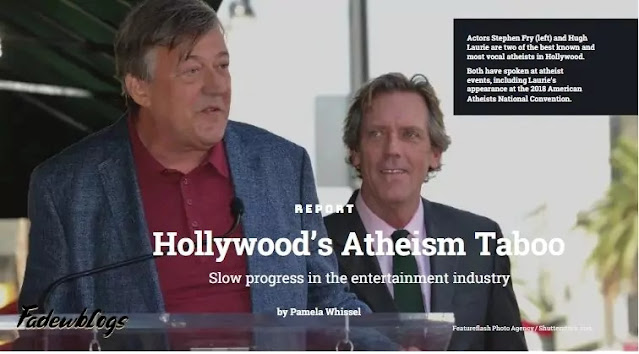Subtle Improvements In The Atheism Scene In Hollywood
"I think of Britain and America differing by about five percent in most things,” said Hugh Laurie to Larry King when asked his opinion on the biggest difference between the two countries.
The year was 2013, and the British actor and musician had recently completed an eight-season run of House, M.D., the critically acclaimed television series about a surly physician with a genius for solving medical mysteries, a lack of empathy for his fellow human beings, and absolute disdain for anyone who believed in God.
Laurie joked that “we have five percent less melted cheese on our food” to illustrate just how small our differences are. “Our lapels are five percent narrower, maybe. We’re incredibly alike,” he reiterated.
Except when it comes to religion. The difference there? “Ten thousand percent. This is a very, very, devout religious country. Europe, by and large, is not.”
To put it in more concrete terms, he offered England’s former prime minister Tony Blair as an example.
As practicing Catholic campaigning for the public office, Blair had to downplay his religious affiliation to the point of virtually concealing it.
“Over here, that’s a plus,” King responded, referring to America’s attitude toward politicians. That was an understatement in 2013 and is even more so now.
To run for president in the United States as an open atheist would be political suicide. Overt atheism is not a smart career choice in American show business, either.
In fact, thanking the lord for winning an Oscar, Emmy, or Golden Globe is common, just as it is for professional athletes who win the big game.
And even if they don't praise their divine maker as they receive the trophy, athletes who are atheists aren’t pouring out of the closet the way they barrel out of the tunnel on game day. Arizona Cardinal quarterback Josh Rosen is currently the lone openly atheist player in the NFL.
House M.D. is on the very short list of examples of an atheist motif in a Hollywood production. Others include The Big Bang Theory, which stars Jim Parsons as SheldonCooper, a physicist and atheist.
In the prequel spin-off series, Young Sheldon, Iain Armitage plays Sheldon as a boy who is not afraid to stand up in church to debate his pastor on the existence of God. Ricky Gervais is also on this shortlist.
Besides speaking and writing frequently about being an atheist, Gervais wrote, directed, and starred in the feature film The Invention of Lying, an allegory for religious belief. Comedian Kathy Griffin is another example.
In her 2007 Emmy Award acceptance speech, she said, “A lot of people come up here, and they thank Jesus for this award. I want you to know that no one had less to do with this award, so suck it, Jesus! This award is my god now!”
Saturday Night Live alum Julia Sweeney is on the list for writing and performing her one-woman autobiographical play Letting Go of God, which was eventually made into a film.
In his book The God Delusion, Richard Dawkins gives high praise to the work: “Part of Julia Sweeney’s gift is to make you cry and laugh at the same time.”
Other examples exist, but not many, and it’s not because there aren't atheists in Hollywood. “There are more than we realize,” said reporter Natasha Stoynoff, who interviewed hundreds of celebrities over the course of a seventeen-year career with People magazine.
“They’re not open about it for the same reason other people aren’t. It’s a stigma, and coming out of the closet could mean losing your community.”
━━━━━━━━━━━━━━━━━━━━━━━━━━━━━━━━━━━━━━━━━━━━━━━━━━━
Related: Why Coming Out As An American Atheist Is Worth It
━━━━━━━━━━━━━━━━━━━━━━━━━━━━━━━━━━━━━━━━━━━━━━━━━━━
For celebrities, the loss extends beyond the community. “They may worry that if they call themselves an atheist, their fan base will shrink, making them less marketable and therefore less employable,” she added.To be fair, there are actors who, when asked in interviews, have professed to be atheists or agnostic. A more recent example is Daniel Radcliffe.
In an interview with the New York Post, he said, “I don't expect there to be a God and an afterlife—I would be pleasantly surprised if there was.”
The results are even better when an atheist character’s storyline is integral to a product without it being a character flaw. But the strongest influence comes when a celebrity lends considerable clout to an organization.
Hugh Laurie did just that for American Atheists at our 2018 National Convention in Oklahoma City where he, in his words, stood with us as a proud atheist.
The actor, writer, and filmmaker Stephen Fry is another stellar example of a performance artist who can eloquently dismantle atheism’s stigma.
In 2009, he partnered with Christopher Hitchens in a televised debate sponsored by the Intelligence Squared media company.
Although it wasn’t a Hollywood production, it is very much worth mentioning here. The debate topic was “The Catholic Church is a Force for Good in the world” and even though their opponents were archbishop and a member of the British Parliament, the audience poll was taken afterward declared Hitchens and Fry the winners.
When a magazine in the U.S.mentions Stephen Fry and Hugh Laurie in the same article, some due diligence is in order.
It would be downright negligent for the writer not to digress and tell American fans of House, M.D. about their early collaborations, which includes Jeeves and Wooster, a four-season British television adaptation of the novels of P.G.Wodehouse.
Watching just a few minutes of a Jeeves and Wooster episode is all that’s necessary to understand that there is no actor with a range vaster than Hugh Laurie’s.
The difference between his playing Gregory House and his playing Bertie Wooster is about the same as the difference between the U.S. and Britain when it comes to religion: ten thousand percent.
━━━━━━━━━━━━━━━━━━━━━━━━━━━━━━━━━━━━━━━━━━━━━━━━━━━


